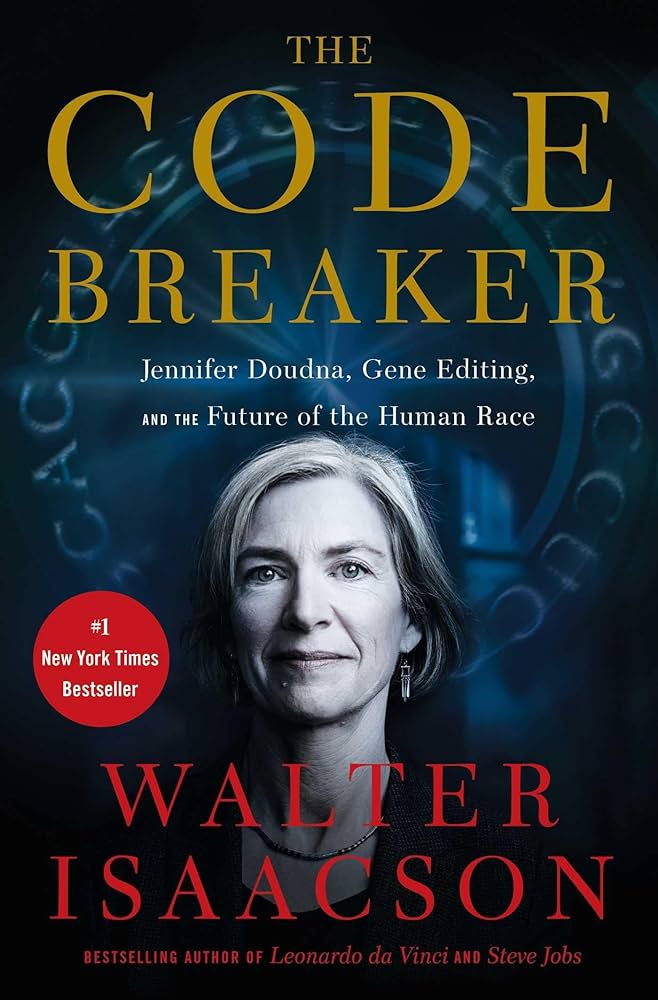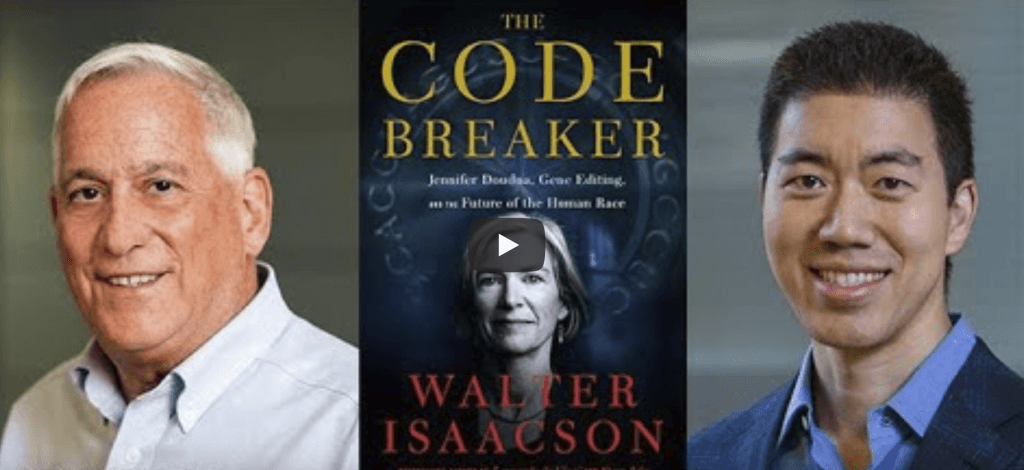
Imagine unlocking the secrets of our DNA, with the power to edit genes as easily as a sentence in this blog post. That’s no longer a scene from science fiction; it’s a reality today thanks to trailblazers like Jennifer Doudna and her colleagues.
You’ve probably heard about gene editing technology called CRISPR, but understanding its impact on the future of humanity is quite another matter. Well-known biographer Walter Isaacson brings us face-to-face with these groundbreaking discoveries in “The Code Breaker,” revealing how they could reshape our world.
Now picture yourself embarking on an intellectual journey guided by Isaacson’s acclaimed storytelling—a narrative that fuses biography with cutting-edge science. This book offers not just a glimpse into Doudna’s life but also plunges into the profound ethical dilemmas posed by manipulating life’s code.
It promises to be an exploration that both enlightens and challenges your views on what it means to be human in an era where “playing God” is becoming more than metaphorical. Get ready for an eye-opening read!
Key Takeaways
- “The Code Breaker” tells the story of Jennifer Doudna, who won a Nobel Prize for her work with CRISPR gene editing.
- The book talks about how gene editing can change the way we treat diseases and grow food but also brings up important questions about right and wrong.
- Walter Isaacson wrote the book in a way that makes hard science easy to understand for everyone.
Who is Jennifer Doudna?
Jennifer Doudna is a renowned Nobel Prize-winning scientist known for her significant role in gene editing. Her childhood and early career, as well as her impact on the field of genetic engineering, will be discussed further in this blog.
Childhood and Early Career
Jennifer Doudna grew up in Hawaii, where she developed a love for science. Her dad gave her a copy of “The Double Helix” when she was young. This sparked her interest in DNA and the secrets of life.
In school, her passion for biology blossomed. She went to college at Pomona College in California and then to Harvard Medical School for graduate studies.
Her early career took off with important work on RNA, which is a cousin to DNA. At Yale University, she began making discoveries about how cells use RNA. Later, as a professor at the University of California, Berkeley, Jennifer made one monumental discovery: CRISPR-Cas9 gene editing technology.
This changed everything in genetic engineering and earned her the Nobel Prize alongside Emmanuelle Charpentier.
Role in Gene Editing
Jennifer Doudna, a Nobel-winning scientist, has played a pivotal role in the field of gene editing. Her groundbreaking work on CRISPR has revolutionized biotechnology and molecular biology.
Doudna’s research has opened new frontiers in genetic manipulation and genome editing, paving the way for potential benefits in treating genetic diseases. However, her work also raises ethical implications surrounding bioethics and the moral questions related to altering the human genome.
The book provides insight into Doudna’s scientific achievements and their potential impact on the future of humanity.
The Impact of Gene Editing
Gene editing has sparked ethical controversies over the potential for designer babies and genetic manipulation. However, it also holds promise for treating genetic diseases and improving crop resilience.
The book explores these contrasting views and their implications for the future of humanity.

Ethical Controversies
Gene editing has sparked ethical controversies due to its potential to alter the human genetic code. The CRISPR technology, while holding promise for treating genetic diseases, also raises concerns about designer babies and the implications of playing with nature.
Doudna’s groundbreaking work in gene editing has propelled discussions on the ethical boundaries of manipulating human DNA, emphasizing the need for thoughtful consideration and regulation in this rapidly evolving field.
The prospect of altering genetic traits through gene editing brings forth questions about where to draw the line between medical necessity and enhancement. As scientists continue to unlock the potential of CRISPR, society grapples with balancing scientific progress with ethical considerations surrounding human intervention at a fundamental biological level.
Potential Benefits and Risks
Jennifer Doudna’s pioneering work in gene editing using CRISPR has raised hopes for treating genetic diseases and improving agricultural productivity. The potential benefits of this technology include the ability to correct genetic mutations, develop new treatments for illnesses, and produce disease-resistant crops, addressing critical global challenges.
However, the use of CRISPR also brings ethical concerns and potential risks. The controversial aspects include fears about unintended consequences from altering DNA, the possibility of creating designer babies with enhanced traits, and the ethical considerations of making heritable changes to human genes.
Striking a balance between harnessing the potential benefits of gene editing while mitigating its associated risks remains an ongoing challenge that requires careful consideration.
Highlights from the Book
Doudna’s scientific discoveries, personal struggles and breakthroughs, and collaborations with other scientists are all highlighted in the book. This provides a deeper understanding of her journey as a Nobel-winning scientist in gene editing.
Doudna’s Scientific Discoveries
Jennifer Doudna, a Nobel-winning scientist, has made significant scientific breakthroughs in the field of gene editing. Her pioneering work on CRISPR (Clustered Regularly Interspaced Short Palindromic Repeats) has revolutionized the possibilities for targeted genetic modifications.
This discovery has immense potential to treat genetic diseases and develop new therapies that could profoundly impact the future of the human race.
Doudna’s scientific discoveries have not only earned her global recognition but have also sparked ethical controversies regarding the implications of gene editing. The book delves into her groundbreaking research, shedding light on both the marvels and concerns surrounding gene editing and its potential to shape our genetic destiny.
Personal Struggles and Breakthroughs
Following Jennifer Doudna’s scientific discoveries, The Code Breaker also delves into her personal struggles and breakthroughs. Doudna faced challenges in a male-dominated field but persisted in pursuing her passion for science.
She overcame setbacks and self-doubt to make groundbreaking contributions to the field of gene editing, ultimately winning the Nobel Prize for her pioneering work with CRISPR.
Doudna’s journey was marked by perseverance and determination, leading to significant breakthroughs that have revolutionized the understanding of genetics and its potential applications.
Collaborations with Other Scientists
Jennifer Doudna has collaborated with numerous scientists, leading to groundbreaking developments in gene editing. Her partnership with Emmanuelle Charpentier resulted in the seminal discovery of the CRISPR-Cas9 tool, which revolutionized genetic engineering.
Additionally, her work with other researchers has furthered our understanding of CRISPR and its potential applications. Together, these collaborations have propelled gene editing into a new era, opening doors to transformative advancements in medicine and biotechnology.
Doudna’s collaborative efforts have been instrumental in advancing the field of gene editing and are pivotal for realizing its full potential. Her partnerships exemplify how scientific cooperation leads to remarkable breakthroughs that can shape the future of humanity.
Critiques and Discussions of the Book
Readers have praised the thorough research and engaging storytelling in “The Code Breaker,” but some critics have mentioned issues with the accuracy of certain information. The book’s writing style and tone has also sparked discussions among readers and critics alike.
Accuracy of Information
Walter Isaacson’s book, “The Code Breaker: Jennifer Doudna, Gene Editing, and the Future of the Human Race,” provides accurate details about Nobel Prize winner Jennifer Doudna and the revolutionary CRISPR technology.
Isaacson meticulously portrays Doudna’s scientific achievements while delving into the ethical implications of gene editing on humanity. The book gives an insightful and precise look at Doudna’s life, her contributions to gene editing, and their potential impact on future generations.
Published in March 2021 by Simon & Schuster, this biography seamlessly weaves together accurate information about Doudna’s groundbreaking work with clear and engaging storytelling.
The Washington Post hailed Walter Isaacson’s portrayal of Jennifer Doudna in “The Code Breaker” as compelling. A respected author known for his bestselling books like Leonardo da Vinci and Steve Jobs, Isaacson ensures that readers get a factually sound account of Doudna’s journey as a scientist pioneering the frontier of gene editing.
Writing Style and Tone
Walter Isaacson’s writing style in “The Code Breaker” is engaging and accessible. He seamlessly weaves scientific concepts with Jennifer Doudna’s personal journey, making the complex world of gene editing understandable to a wide audience.
The tone is informative yet captivating, taking readers on a compelling exploration of Doudna’s groundbreaking work and its potential impact on humanity. By combining storytelling with scientific insights, Isaacson creates an immersive reading experience that sheds light on both the brilliance and ethical challenges of gene editing.
Reception from Readers and Critics
Having discussed the writing style and tone, let’s delve into how “The Code Breaker” has been received by readers and critics. The book has garnered positive feedback, with The Washington Post calling it “compelling.” It offers an insightful exploration of Nobel Prize winner Jennifer Doudna’s groundbreaking work in gene editing through a captivating narrative.
Readers have appreciated its blend of biography and biology, providing a comprehensive understanding of CRISPR and its potential impact on the future. Critics have praised its portrayal of Doudna’s scientific achievements and ethical implications while acknowledging the author Walter Isaacson’s knack for engaging storytelling.
The Code Breaker has captivated readers with its in-depth look at Jennifer Doudna’s revolutionary work in gene editing. Its ability to make complex scientific concepts accessible has resonated well with audiences, while also sparking discussions about the ethics surrounding genetic manipulation.
Conclusion: Final Thoughts on “The Code Breaker” by Walter Isaacson
In conclusion, “The Code Breaker” by Walter Isaacson offers a captivating insight into the achievements of Nobel Prize winner Jennifer Doudna and the groundbreaking science of gene editing.
The book explores the ethical controversies and potential impacts of CRISPR technology on human life. With its engaging narrative and in-depth look at Doudna’s pioneering work, “The Code Breaker” provides a thought-provoking exploration of genetic destiny and the future implications of gene editing.
Readers are left with a greater understanding of Doudna’s contributions to science and the moral questions raised by advancements in gene editing technology.
FAQs
1. Who is Jennifer Doudna and why is she in the book “The Code Breaker”?
Jennifer Doudna is a Nobel-winning scientist who helped discover gene editing technology, and “The Code Breaker” by Walter Isaacson tells her story.
2. What is “The Code Breaker” about?
“The Code Breaker” by Walter Isaacson talks about how gene editing can change the human race’s future, focusing on Jennifer Doudna’s work.
3. Is “The Code Breaker” only for people who know science well?
No, anyone interested in science and the future of humans can read “The Code Breaker.” It explains complex ideas in simple ways.
4. Does the book talk about what could happen next with gene editing?
Yes, Walter Isaacson’s book looks at how Jennifer Doudna’s breakthroughs might shape our world and what we might do with gene editing down the road.




